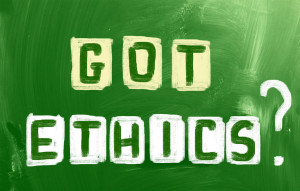Why are ethics important?
 What do you do when no one is watching? Are your actions in line with your values, with your commitments, with established laws, and with the concepts of right and wrong? Do you have integrity? In short, are your actions ethical?
What do you do when no one is watching? Are your actions in line with your values, with your commitments, with established laws, and with the concepts of right and wrong? Do you have integrity? In short, are your actions ethical?
Ethics, as defined by the Merriam-Webster Dictionary, is nothing more or less than behavior “based on ideas which are morally right or wrong.”
To align your choices, actions and priorities with what is inherently right, regardless of the situation, is the very basis of ethical behavior. A strong code of ethics in your personal life, in business and in government builds trust. There is virtually no facet of life in which ethics does not play some role.
Henry Paulson, the 74th U.S. Secretary of the Treasury, said it best when he stated that “there’s nothing more important than ethics.”
His belief is supported by renowned musician Wynton Marsalis who proclaimed, “Ethics are more important than laws.”
Why is that? Laws govern the land, but the adherence to not only written law but principles of right are governed by individual choices. Ethics. Something may not be illegal, but that doesn’t make it right. Ethics help make those gray areas clear.
Employees of service districts in Utah are expected to know and follow the Utah State Officers Employees Ethics Act. The document itself may seem complex; however, the code of conduct can be summed up by this quote from Potter Stewart, former Associate Justice of the Supreme Court of the United States:
“Ethics is knowing the difference between what you have a right to do and what is right to do.”
The state code of ethics is designed to help the people of Utah gain a strengthened faith and confidence in their government.
As a member of the Utah Association of Special Districts, you have access to training provided by our knowledgeable specialists who will walk you through Title 67-17 of the Utah State Code in an informative and educational way, teaching you how to enact its principles and requirements in your district.






